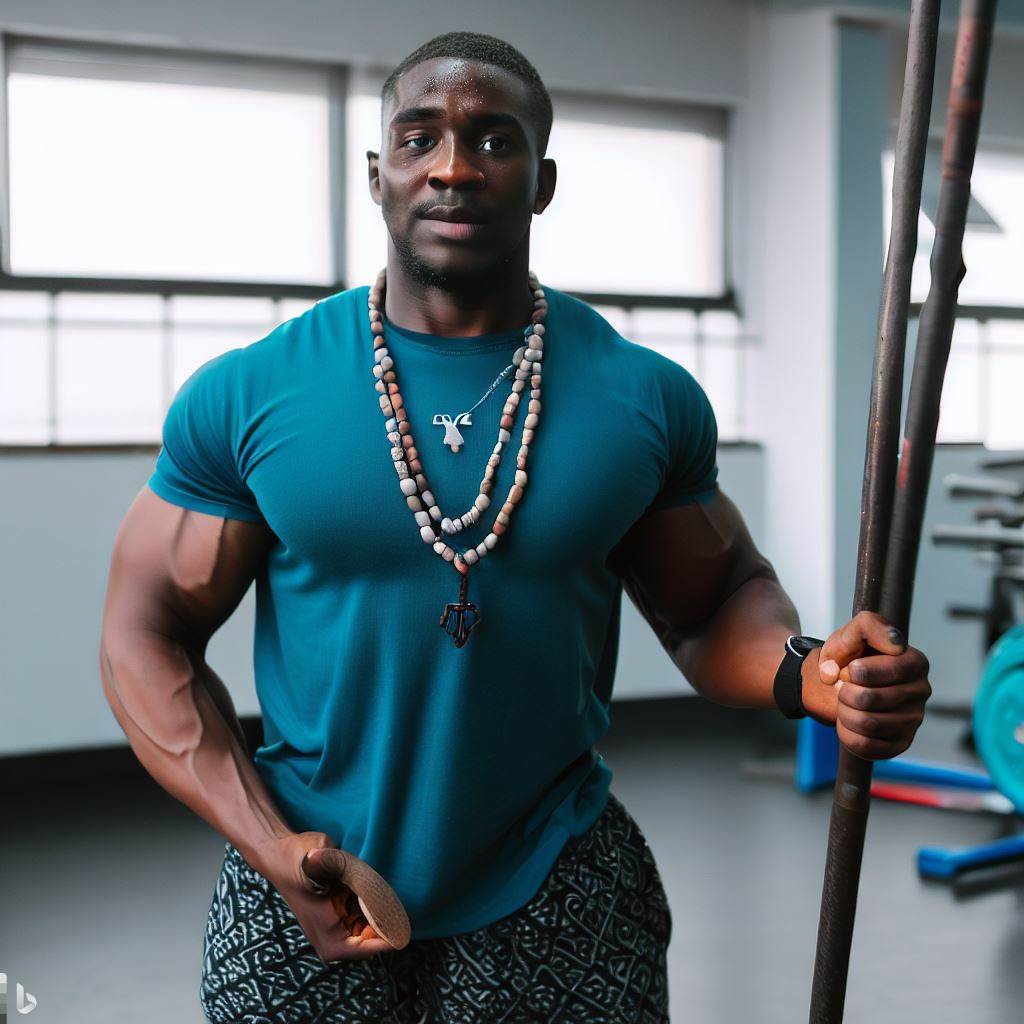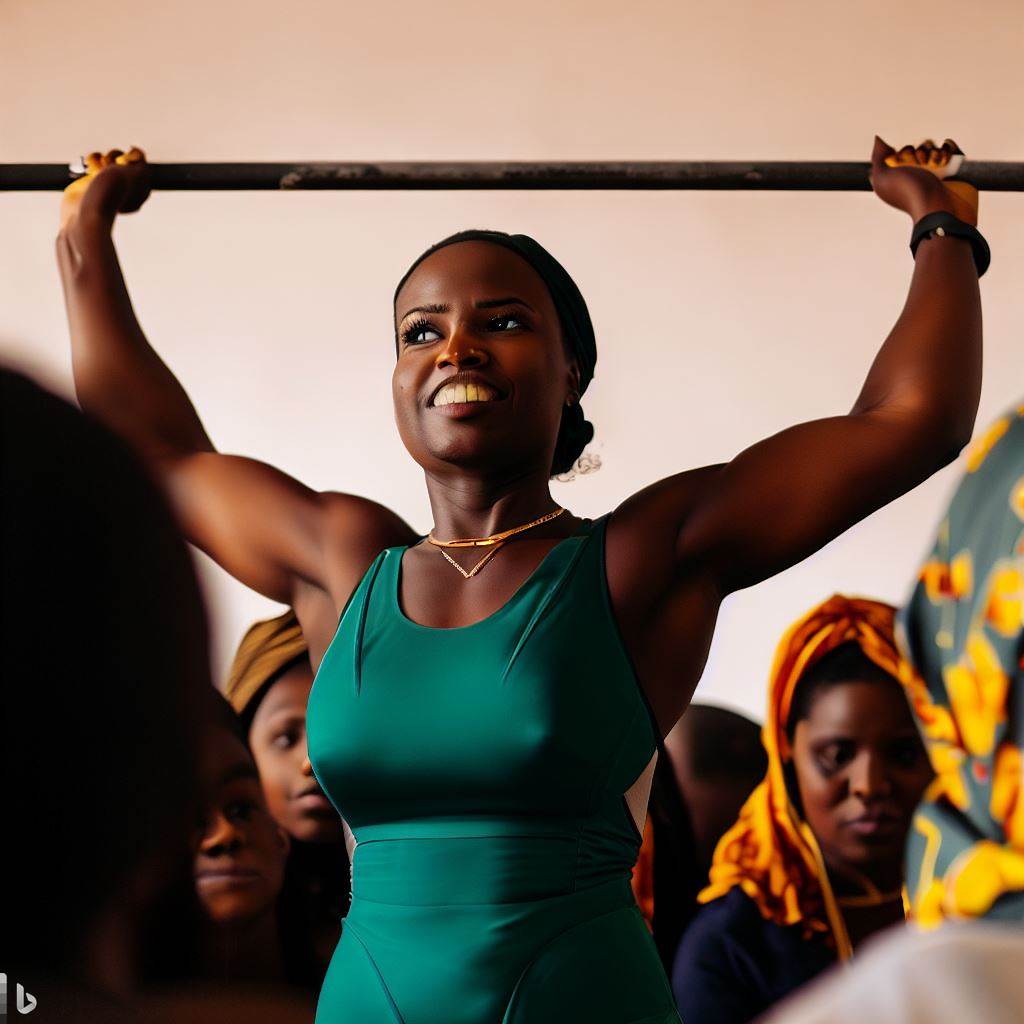Introduction
Creating a strong brand is vital for any business, including strength coaching in Nigeria. A brand represents the identity and reputation of a company, product, or service.
It encompasses the values, personality, and promise that sets it apart from competitors.
In the context of strength coaching in Nigeria, establishing a strong brand is crucial for success.
Nigeria has seen a surge in the demand for fitness and wellness services, and strength coaching plays a significant role in this domain.
Strength coaching involves helping individuals enhance their physical strength and overall fitness through specialized training programs.
It encompasses various activities such as weightlifting, resistance training, and conditioning exercises.
Nigeria, a country known for its passion for sports and athletics, has embraced strength coaching as a means to achieve optimal physical fitness.
With an increasing number of people seeking professional guidance to improve their strength and overall health, the coaching industry has witnessed tremendous growth.
Developing a strong brand in the field of strength coaching in Nigeria is essential for several reasons.
Firstly, it differentiates a coach from others in the market, helping potential clients make informed decisions.
A strong brand also builds trust and credibility, as clients are more likely to choose a coach who has a reputable and recognized brand.
Furthermore, a strong brand fosters loyalty among clients, as they identify with the coach’s values and connect with their unique approach to strength coaching.
This, in turn, leads to referrals and positive word-of-mouth, expanding the coach’s client base.
Creating a strong brand is integral to the success of strength coaching in Nigeria.
It provides a competitive advantage, builds trust, and fosters client loyalty, ultimately contributing to the growth and sustainability of coaches in this thriving industry.
Understanding the Nigerian Fitness Industry
A. Brief History of the Fitness Industry in Nigeria
- The development of the fitness industry in Nigeria can be traced back to the early 1980s.
- At that time, fitness centers started to emerge in major cities, catering to a growing middle-class population.
- These early fitness centers primarily focused on cardiovascular exercises and aerobics.
- They were considered a luxury and were only accessible to a small segment of the population.
- As the years went by, the demand for fitness services increased, leading to the expansion of the industry.
- New fitness centers opened, offering a wider range of fitness activities and services.
- Strength coaching became increasingly popular, as people realized the importance of resistance training.
- Today, the fitness industry in Nigeria has become more diverse and competitive.
B. Current Trends and Developments in the Industry
- With the rise of social media and increased awareness of fitness, there has been a surge in fitness enthusiasts.
- People are now more conscious about their health and appearance, seeking professional guidance.
- Fitness influencers and online training programs have gained popularity, providing accessible fitness options.
- The focus has shifted towards holistic wellness, including nutrition, mental health, and lifestyle changes.
- Technology has also played a significant role in shaping the fitness industry in Nigeria.
- Mobile apps and wearables are being utilized to track progress, set goals, and stay motivated.
- Furthermore, corporate wellness programs have gained traction, with companies promoting employee health.
- The industry has become more inclusive, with fitness centers catering to all age groups and fitness levels.
C. Potential for Growth and Opportunities for Strength Coaching
- Despite the progress made, the Nigerian fitness industry still has untapped potential for growth.
- Many regions, especially rural areas, lack access to proper fitness facilities and trained professionals.
- This presents an opportunity for strength coaches to establish their presence and fill the gap.
- As more Nigerians realize the benefits of strength training, the demand for qualified strength coaches will increase.
- Strength coaching can target various segments, including athletes, fitness enthusiasts, and individuals recovering from injuries.
- The growing middle-class population with disposable income is willing to invest in their health and fitness.
- Strength coaches can offer personalized training programs and nutritional guidance to meet individual needs.
- Additionally, collaborations with healthcare providers and corporate wellness initiatives can lead to further opportunities.
The Nigerian fitness industry has come a long way, evolving from a luxury for a few to an essential part of many people’s lives.
The industry has witnessed significant trends and developments, driven by increased awareness and technological advancements.
There is vast potential for growth, particularly in underserved areas, creating opportunities for strength coaching professionals.
By tapping into this potential, strength coaches can contribute to the overall well-being of Nigerians and help them achieve their fitness goals.
Essential Elements of Creating a Brand
A. Identifying your target audience
- Conduct market research to understand the demographics, interests, and needs of your potential customers.
- Analyze competitors to identify gaps in the market and find opportunities to target specific customer segments.
- Create buyer personas to define your ideal customer profiles and tailor your brand message accordingly.
B. Defining your unique value proposition
- Identify what sets your strength coaching business apart from competitors.
- Highlight the benefits and solutions you offer that solve your target audience’s pain points.
- Clearly articulate your unique selling points to differentiate your brand from others in the industry.
C. Creating a memorable brand name and logo
- Choose a brand name that reflects your coaching philosophy, values, and resonates with your target audience.
- Design a visually appealing logo that represents your brand’s identity and stands out from the competition.
- Ensure your brand name and logo are simple, memorable, and easily recognizable.
D. Establishing brand voice and personality
- Define your brand’s tone of voice, whether it’s professional, friendly, authoritative, or casual.
- Maintain consistency in your brand’s communication across all channels, including social media, website, and customer interactions.
- Develop a brand personality that aligns with your target audience’s values and preferences.
Building a strong brand involves several essential elements.
If you’re starting a strength coaching business in Nigeria, it’s crucial to understand these elements to create a successful brand.
Identifying your target audience is the first step in creating a brand.
Conduct thorough market research to gain insights into the demographics, interests, and needs of your potential customers.
This information will help you tailor your brand message and offerings to your target audience.
Defining your unique value proposition is crucial in setting yourself apart from your competitors.
Identify what makes your strength coaching business unique and highlight the benefits and solutions it offers.
Clearly articulating your unique selling points will attract customers who resonate with your brand.
Creating a memorable brand name and logo is essential for brand recognition.
Choose a brand name that reflects your coaching philosophy and resonates with your target audience.
Design a visually appealing logo that represents your brand’s identity and catches the attention of potential customers.
Establishing your brand voice and personality will help you communicate effectively with your target audience.
Define your brand’s tone of voice and maintain consistency across all communication channels.
Developing a brand personality that aligns with your customers’ values and preferences will create a strong emotional connection with them.
By incorporating these essential elements into your brand strategy, you can lay a strong foundation for your strength coaching business.
Remember that building a successful brand takes time and consistency.
Stay focused on delivering value to your target audience, and your brand will continue to grow and thrive.
Building a Strong Online Presence
A. Developing a User-Friendly Website
- A website should be easy to navigate, visually appealing, and should load quickly.
- Ensure that your website provides relevant and updated information about your strength coaching services.
- Include a contact page with your address, contact number, and email for potential clients to reach out.
- Regularly update your website with blog posts, success stories, and testimonials to keep it engaging and informative.
B. Utilizing Social Media Platforms Effectively
- Create social media profiles on platforms such as Facebook, Instagram, and Twitter to reach a wider audience.
- Regularly post content related to strength coaching, including workout tips, inspirational quotes, and success stories.
- Engage with your followers by responding to comments, messages, and inquiries in a timely manner.
- Run contests, giveaways, or promotions to increase engagement and attract new followers to your social media pages.
C. Utilizing Search Engine Optimization (SEO) Techniques
- Research and incorporate relevant keywords in your website content to improve its visibility on search engine results.
- Optimize your website’s performance by improving its loading speed and mobile responsiveness.
- Include meta tags, meta descriptions, and alt tags for your website’s images to enhance its SEO.
- Create backlinks by guest posting on relevant blogs or collaborating with other fitness professionals.
D. Engaging with Online Communities and Influencers
- Join online fitness and strength coaching communities where you can share your expertise and connect with potential clients.
- Collaborate with popular social media influencers or fitness bloggers who have a similar target audience.
- Contribute valuable content to these communities by answering questions, sharing tips, and providing guidance.
- Build relationships with influencers and community members to expand your network and increase your online visibility.
By implementing these strategies, you can create a strong online presence for your strength coaching brand in Nigeria.
A user-friendly website combined with effective use of social media, SEO techniques, and engagement with online communities will help you reach and connect with your target audience.
Enhance your brand’s visibility, and ultimately attract more clients.
Read: Fitness Trends: Nigeria’s Strength Coaching Scene

Nurturing Brand Reputation and Credibility
A strong brand reputation is essential for any business to succeed.
In the case of Strength Coaching in Nigeria, building and nurturing brand reputation and credibility is crucial in attracting clients and standing out in a competitive market.
A. Providing high-quality coaching services
One of the most effective ways to establish brand reputation and credibility is to consistently deliver high-quality coaching services.
This means having well-trained coaches who are knowledgeable and experienced in strength training.
By providing valuable and effective coaching, clients will trust the brand and it will develop a positive reputation in the industry.
B. Focusing on customer satisfaction and testimonials
Another important aspect of nurturing brand reputation is focusing on customer satisfaction.
Happy and satisfied clients are more likely to recommend the coaching services to others, which helps build the brand’s credibility.
Additionally, collecting and showcasing testimonials from satisfied clients can further enhance the brand’s reputation and attract potential clients.
C. Collaborating with reputable partners and organizations
A brand’s reputation and credibility can also be boosted by associating with reputable partners and organizations.
By collaborating with well-known organizations or partnering with esteemed professionals in the fitness industry, the brand can gain credibility and validation.
This partnership showcases that the brand is respected and trusted by other experts and enhances its reputation among potential clients.
D. Participating in relevant industry events and conferences
Active participation in industry events and conferences is another effective way to nurture brand reputation and credibility.
By attending and speaking at conferences, the brand’s coaches can establish themselves as experts in the field.
This helps build trust among potential clients and positions the brand as a reliable and credible source of strength coaching expertise.
Building and nurturing brand reputation and credibility is vital for the success of Strength Coaching in Nigeria.
By providing high-quality coaching services, focusing on customer satisfaction and testimonials, collaborating with reputable partners, and participating in relevant industry events.
The brand can establish itself as a trustworthy and credible choice in the market.
Read: Athletic Directors: Nigeria’s Sports Development Leaders
Creating and Implementing a Marketing Strategy
Creating and implementing a marketing strategy is crucial for the success of any business, including strength coaching in Nigeria.
A. Identifying marketing objectives and goals
The first step in creating a marketing strategy is to clearly define the objectives and goals of the business.
These objectives should be specific, measurable, achievable, relevant, and time-bound.
For a strength coaching business in Nigeria, marketing objectives may include increasing brand awareness, attracting new clients, and retaining existing clients.
By identifying these objectives, the business can focus its marketing efforts and measure its success.
B. Conducting market research and competitor analysis
Before developing a marketing plan, it is essential to conduct thorough market research and competitor analysis.
This research helps in understanding the target market, including the demographics, preferences, and needs of potential clients in Nigeria.
Additionally, competitor analysis enables the business to identify its unique selling points and position itself in the market.
By understanding the market and competition, the strength coaching business can tailor its marketing strategy effectively.
C. Developing a comprehensive marketing plan
Once the objectives, goals, and market research are in place, it is time to develop a comprehensive marketing plan.
This plan outlines the specific marketing activities that will be executed to achieve the identified goals.
It includes strategies for product promotion, pricing, distribution, and branding, among others.
The marketing plan should also define the target audience, positioning, and key messages that will be communicated.
By having a well-defined plan, the strength coaching business can ensure that its marketing efforts are coordinated and effective.
D. Utilizing various marketing channels, such as email marketing and content marketing
To reach the target audience effectively, the strength coaching business should utilize various marketing channels.
Email marketing can be used to nurture relationships with potential and existing clients, providing valuable information and offers.
Content marketing, through blog posts, videos, and social media, can establish the business as an authority and attract potential clients.
Other marketing channels, such as social media advertising, search engine optimization, and influencer partnerships, can also be utilized.
By using a mix of marketing channels, the strength coaching business can maximize its reach and engagement with the target audience.
Creating and implementing a marketing strategy for a strength coaching business in Nigeria is essential for success.
By identifying marketing objectives and goals, conducting market research, and developing a comprehensive marketing plan, the business can effectively reach its target audience.
Utilizing various marketing channels, such as email marketing and content marketing, further enhances the chances of attracting and retaining clients.
With a well-executed marketing strategy, the strength coaching business can build a strong brand and thrive in the Nigerian market.
Read: Success Stories: Top Athletic Directors in Nigeria
Find Out More: Fitness Nutrition: The Impact on Athletes in Nigeria
Expanding Network and Generating Leads
A. Leveraging personal and professional networks
- Leverage personal and professional networks to spread awareness and increase brand visibility.
- Participate in industry events and conferences to connect with potential clients and build relationships.
- Engage with potential clients through interactive workshops and informative seminars.
- Create partnerships with complementary businesses and industry influencers to expand reach and credibility.
- Collaborate on joint projects or events to generate leads and gain exposure to new audiences.
- Utilize lead generation techniques, such as lead magnets and gated content, to capture contact information.
- Create valuable content, such as e-books or whitepapers, and require opt-in for access.
- Offer free consultations or assessments as a way to engage with potential clients and showcase expertise.
B. Engaging with Potential Clients through Workshops and Seminars
- Workshops and seminars are powerful tools for showcasing expertise and building trust among potential clients.
- Plan informative sessions that highlight your coaching methods, addressing the needs and goals of your target audience.
- Offer practical insights and hands-on experiences to demonstrate the value you bring as a strength coach.
- Promote these events through social media, newsletters, and local networks to maximize attendance and engagement.
- During sessions, interact actively with participants, answering questions, and providing personalized advice.
- Create a follow-up strategy to maintain contact and nurture relationships with attendees.
C. Partnering with Complementary Businesses and Influencers
- Identify businesses and influencers in the fitness and wellness industry that align with your coaching philosophy.
- Forge mutually beneficial partnerships to expand your reach and credibility.
- Collaborate on co-branded events, content, or promotions to tap into each other’s audiences.
- Leverage their influence to endorse your coaching services and gain referrals.
D. Utilizing Lead Generation Techniques, such as Lead Magnets and Gated Content
- Develop valuable resources like e-books, guides, or exclusive training videos as lead magnets.
- Use these incentives to capture potential clients’ contact information on your website or social media.
- Create gated content accessible to those who provide their details, building your email list.
- Craft engaging landing pages and compelling calls-to-action to encourage sign-ups.
- Nurture leads through targeted email campaigns, offering further insights and coaching information.
- Track the performance of your lead generation efforts to refine and optimize your strategies.
Incorporate these strategies to build your brand as a strength coach in Nigeria. Connect with clients, form partnerships, and grow your business effectively.
Tailor your approach to your specific industry and target audience to achieve the best results.
Read: Key Certifications for Strength Coaches in Nigeria
Measuring Brand Success and Making Necessary Adjustments
A successful brand is not built overnight, and it requires continuous monitoring and adaptability to stay relevant in a dynamic market.
In this section, we will explore the various methods and strategies for measuring brand success and making necessary adjustments to ensure continued growth and customer satisfaction.
A. Setting key performance indicators (KPIs) to track progress
Key performance indicators (KPIs) are metrics that can help assess the success and effectiveness of your brand strategies.
By setting specific KPIs, you can track your progress and make data-driven decisions.
- Identify the most relevant KPIs for your strength coaching brand, such as customer acquisition rate, customer retention rate, and revenue growth.
- Regularly analyze and evaluate these KPIs to gauge the overall performance of your brand.
- Use tools and software to track and measure your KPIs accurately.
B. Analyzing website and social media analytics
With the rise of digital marketing, analyzing website and social media analytics has become crucial in measuring brand success.
These analytics provide valuable insights into your brand’s online presence and customer engagement.
- Track the number of website visitors, page views, and bounce rates to assess the effectiveness of your online presence.
- Analyze social media metrics such as follower growth, engagement rate, and reach to understand the level of audience interaction.
- Compare your performance against industry benchmarks to identify areas for improvement.
C. Gathering customer feedback and conducting surveys
Direct feedback from customers is an invaluable resource for measuring brand success.
By actively listening to your customers’ opinions and conducting surveys, you can gain a deeper understanding of their needs and satisfaction levels.
- Regularly seek feedback from your customers through channels like email, social media, or personal interactions.
- Create and distribute surveys to gather quantitative data on customer satisfaction, brand perception, and areas for improvement.
- Analyze the feedback and survey results to identify patterns, trends, and opportunities for enhancing your brand.
D. Making adjustments based on data-driven insights
Tracking and analyzing various metrics will provide you with data-driven insights that can guide your brand adjustments and decision-making process.
- Identify areas of improvement based on the data and insights gathered.
- Develop strategies and tactics to address the identified areas, such as optimizing website content or refining your social media campaigns.
- Implement the necessary adjustments to your brand strategies and monitor their impact on your KPIs.
- Continuously iterate and adapt based on the feedback and data to ensure ongoing brand success.
Measuring brand success and making necessary adjustments is essential for building a strong and sustainable brand.
By setting KPIs, analyzing website and social media analytics, gathering customer feedback, and making data-driven adjustments.
You can continuously improve your brand’s performance and ensure its long-term success.
Gain More Insights: Gender Dynamics in Nigeria’s Fitness Nutrition Field
Conclusion
A brand is crucial for strength coaching in Nigeria as it creates recognition and trust in the industry.
In this section, we discussed the key points of creating a brand for strength coaching in Nigeria.
Aspiring strength coaches in Nigeria should be encouraged and motivated to create their own brand.
By establishing a unique brand identity, strength coaches can stand out from the competition and attract more clients.
Building a brand requires consistent effort in developing a strong online presence and professional image.
Creating a brand is not just about logos and designs, but also about delivering quality coaching services.
A strong brand can lead to increased visibility, higher credibility, and ultimately, business growth for strength coaches in Nigeria.
Take the leap, invest in your brand, and start your journey towards becoming a successful strength coach in Nigeria!




